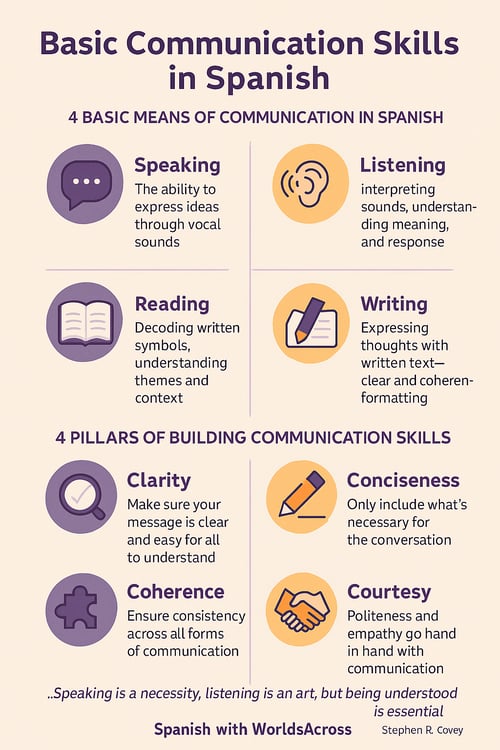
In a world where communication is the most valuable currency, it’s essential to enhance it. Possessing exceptional communication skills leads to success and allows for genuine connections with others. However, every skill must be built from the ground up, and that’s where we start—with the basics. Let's learn how to develop our beginner skills and start building this castle of language.
The Value of Communication
Communication holds an extremely high and essential value in our daily interactions (both personal relationships and the professional realm). That’s why we refer to it as a "currency of exchange." Through communication, we transmit ideas, emotions, information, and values. We also build strong relationships, resolve conflicts, collaborate on projects, and create meaningful connections with others.
What Are Communication Skills?
Communication skills are a set of abilities that allow us to interact effectively with others. These basic communication skills in Spanish include both the ability to convey messages clearly and understandably and the ability to listen to and comprehend others.
3 Reasons to Improve Your Communication Skills
- Increase self-confidence: Mastering communication skills, such as public speaking or negotiating, can boost your self-confidence and your ability to face challenges successfully.
- Strengthen interpersonal relationships: Open and honest communication contributes to the development of healthy and satisfying relationships, both personally and professionally.
- Drive professional success: In the workplace, effective communication is key to leading teams, negotiating deals, persuading others, presenting ideas convincingly, and advancing your career.
Are you ready to transform your basic communication in Spanish and speak like a native? At WorldsAcross, we’ll help you achieve it.
4 Basic Means of Communication in Spanish
-
Speaking
Speaking is the ability to produce articulated sounds using the mouth and other vocal organs to express ideas, thoughts, and emotions. It’s the most common form of verbal communication and allows us to interact directly with others in real-time.
-
Listening
Listening is the ability to pay attention to the sounds and words around us to understand and process the information transmitted by others. It involves not just hearing sounds, but also interpreting their meaning, understanding the context, and responding appropriately.
-
Reading
Reading is the ability to interpret and understand the meaning of written texts. It involves decoding symbols and words to extract information, understand ideas and concepts, and make inferences based on the text's content.
-
Writing
Writing is the skill of expressing ideas, thoughts, and emotions by creating written texts. It involves organizing and structuring ideas coherently, selecting appropriate words and phrases, and conveying information clearly and effectively through the written medium.
In conclusion, speaking, listening, reading, and writing are fundamental means of communication. On the other hand, we must be aware of the diverse abilities of individuals. By adopting and promoting alternative methods of communication, we can ensure that everyone has the opportunity to connect and participate fully in society.

4 Adaptive Means for a Diverse World
- Non-verbal Expression: For people with speech disabilities, communication may include the use of sign language, gestures, facial expressions, and augmentative and alternative communication (AAC) devices to convey messages.
- Visual Reception: For people who are deaf or hard of hearing, information can be received through lip reading, sign language, written texts, and subtitles in visual media.
- Alternative Reading Methods: For people who are blind or have low vision, reading can be done through Braille, audiobooks, screen readers, and other technological devices that convert written text into accessible formats.
- Alternative Writing Systems: For people without limbs or with motor disabilities, writing may include the use of alternative input devices such as adapted keyboards, voice recognition software, assistive devices, and eye-tracking technology to create texts.
In an increasingly interconnected and diverse world, it’s our collective responsibility to inform and promote communicative practices that respect and celebrate individual differences, ensuring true inclusion for all. That’s why here we show you that there are more than 4 basic forms of communication.
How to Build the 4 Pillars/Basic Skills of Your Communication?
We know that when starting a language, we have beginner skills—don’t worry, you can enhance them. By building your communication pillars, you can turn your basic communication in Spanish into advanced. Here are the pillars and some tips:
-
Clarity:
-
- Simplify your message: Use simple words and phrases to ensure your message is easy to understand.
- Organize your ideas: Before communicating, organize your thoughts to present information logically and coherently.
- Avoid jargon: Unless you’re sure your audience understands, avoid using jargon and technical terms.
-
Conciseness:
-
- Get to the point: Avoid beating around the bush and focus on the key points of your message.
- Be brief: Use as few words as possible to convey your message effectively.
- Eliminate the unnecessary: Review your communication and remove redundant or irrelevant information.
-
Coherence:
-
- Align your verbal and non-verbal language: Make sure your tone of voice, facial expressions, and body language match your words.
- Maintain a consistent message: Avoid contradicting yourself and ensure your message is consistent across all platforms and communication channels.
- Reinforce your point: Use examples, anecdotes, or data that support your main message.
-
Courtesy:
-
- Listen actively: Pay attention to your interlocutor, showing interest and respect for their opinions and feelings.
- Be respectful and considerate: Use a kind and respectful tone, regardless of the situation.
- Express gratitude and acknowledgment: Show gratitude and recognition when appropriate, thereby strengthening interpersonal relationships.
In summary, communication skills are indispensable for successful and meaningful human interaction. Developing your beginner skills is essential to understanding and being understood in our society. Let’s work on them! Follow these tips and advice, and change that basic level of communication in Spanish to an advanced level.
“Speaking is a necessity, listening is an art, but being understood is essential.” — Stephen R. Covey





